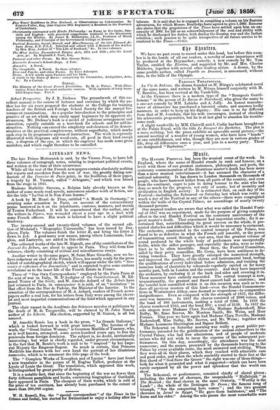LITERARY NEWS.
The late Prince Metternich is said, by the Vienna Press, to have left three volumes of autograph notes, relating to important political events, and written at the time of their occurrence.
While all the rest of the French newspapers contain absolutely nothing but reports and anecdotes from the scat of war, the greatly daring con- ductors of the Courrier de Paris print, in the feuilleton of their paper, a tragedy by H. Viennet, called " Arbogaste," and which was hissed from the stage in 1841.
Madame Mathilde Stevens, a Belgian lady already known as the author of some much-read novels, announces another ork of fiction, un- der the title "Le Oui et le Non d'une femme."
A book by M. Henri de Pene, entitled "A Month in Germany," is creating some sensation in Paris, on account of the extraordinary praise bestowed in it on the inhabitants, customs, manners, and morals of Teuton Fatherland. It will be remembered that the author, one of the writers in Figaro, was wounded about a year ago in a duel with some French officers. His work is believed to have a slight political tendency.
, The twenty-second and twenty-third volumes of the second edi- tion of Michaud's "Biographic Umverselle," has been issued by Des. places, Paris. The volumes finish the letter if, and bring the letter L down to Leh. A good many new names' among others Lamennais, Lan- glois, and Lasterie, are added in this edition.
The collected works of the late H. Rigault, one of the contributors of the Toisrnal des Dads, are about to appear in Paris. They will form four volumes, chiefly consisting of critical and miscellaneous essays.
Another writer in the same paper, M. Saint Marc Girardin, now we be- lieve redacteur en chef of the French Times, has nearly ready for the press a kind of autobiographical sketch, which will appear under the title "Sou- venirs et reflexions d'un Tournaliste," and is expected to give some curious revelations as to the inner life of the Fourth Estate in France.
Three of "Our Own Correspondents" employed by the Paris Press at the seat of war in Italy, M. D'Audigier of the 'anstitutionnel, M. Ed- mond Texier of the Siècle, and M. Amedec Achard of the Debate have just returned to Paris in consequence it is said, of an " invitation " to that effect from the Due de Padouo, the Minister of the Interior. In the cessation of the correspondence of H. A •Achard, readers of French news- papers suffer a real loss, for his letters from Italy were among the clever- 1st and most impartial communications of the kind which appeared in any journal.
The chair vacant in the Academic des Sciences morales et politiques by the death of M. de Toequeville, will be claimed by M. Jules Simon, author of La Libertsr. His election, supported by M. Guizot, is all but assured.
H. Amedee Renee has a book in the press, "La Grande Italienne," which is looked forward to with great interest. The heroine of the work, the "Great Italian Woman," is Countess Matilda of Tuscany, who, as is well known, attempted, some seven hundred years ago, to free the peninsula from foreign dominion. The subject is, no doubt, intrinsically interesting; but what is chiefly regarded, under present circumstances, is the fact that M. Renee's work is said to be "inspired" by her Impe- rial Majesty the Empress-Regent So much is certain, that Princess Matbilde has drawn with her own hand the portrait of her illustrious namesake, which is to ornament the title-page of the book.
. The "Complete Works of Xenophon and of Lucian" have just found a new translator in the person of M. Eugene Talbot, professor at the Lye& of Louis the Great. The translation, which appeared this week, is distinguished by great purity of diction.
It is a notable fact, that since the beginning of the war no fewer than forty different pamphlets and books, containing biographies of Garibaldi, have appeared in Paris. The cheapest of these works, which is sold at the price of ten centimes, has already been purchased to the extent of more than 200,000 copies.
W. H. Russell, Esq. the "special correspondent" of the Times in the Crimea and India), has started for Switzerland to enjoy a holiday after his labours. It is said that he is engaged in compiling a volume on his Eastern adventures, for which Messrs. Rontledge have agreed to give 1,200/. Rumour also states that the proprietors of the Times have settled upon him an an- annuity of 2001. for life as an acknowledgment of the zeal and ability with which he discharged his duties, both daring the Russian war and the Indian rebellion ; such pension to be quite irrespective of all future service to be rendered to the Times.—Critic.
























 Previous page
Previous page